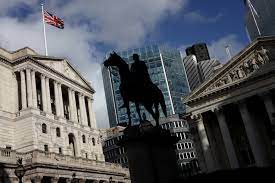IFAC accelerates engagement on anti-corruption and anti-money...
As evolving threats such as climate change, artificial intelligence, and geopolitical conflicts put increasing...
READ MORE
The latest interest rate rise from the Bank of England will have serious consequences for small businesses around the UK, said the country’s biggest business groups.

David Bharier, head of research at the British Chambers of Commerce (BCC), said the bank’s decision to raise interest rates for a 10th consecutive time continued its hard-line approach to inflation but is not without serious side effects.
“Those impacted most by the decision will be mortgage holders and businesses reliant on debt to keep afloat after three years of economic shocks,” he said.
“Our research shows that while inflation remains by far and away the top concern for businesses with 80 per cent citing this in Q4 2022, concern about interest rates has risen sharply with 43 per cent now citing this.
“With the Bank expecting inflation to slow to around 4 per cent by the end of the year, further rate rises could now simply add to the risk of a deeper recession, outweighing the benefits.
“The main driver of inflation for most firms is energy costs, but this requires a clear policy solution, with immediate relief for those most affected and longer-term structural changes to ensure this market failure does not occur again.
“Businesses will also need to see concrete action in the upcoming Budget to promote growth, including plans on infrastructure, tax, skills, and trade.”
The Federation of Small Businesses said higher debt costs will add to pressures many small businesses face amid continuing pain from persistent high inflation.
FSB national chair Martin McTague said small-business cost increases have run considerably above the headline rate and these must be brought down.
“That said, the higher rates come with consequences. The last time the rate was higher was 2008, when inflation was running at around half its current level,” he said.
“With the rising prices of inputs of all kinds, most notably energy, having greatly restricted small businesses’ financial headroom, to then have the cost of debt go up too is a double blow.
“Consumer spending is stuck in the doldrums, with retail spending over the festive period anaemic at best. Increased mortgage and loan costs will further dampen people’s willingness and ability to open their purses, spelling further pain in the short term for consumer-facing industries, which will inevitably feed through to other sectors as the situation persists.
“Our Small Business Index saw a steady rise in the interest rates for finance offered to small businesses over 2022, with a four-fold rise in the proportion of applicants offered a rate of 11 per cent or more on a loan in the final quarter of last year, compared with Q1. Increased mortgage costs therefore come on top of costlier commercial loans, and repayments for debts taken on to get through the pandemic. The small business community that survived COVID-19 is doing so steeped in debt, some of it now more expensive.
“Now, over half of small firms rate the availability and affordability of new credit as poor, up from one in three at the start of 2022. This is especially worrying at a time when cash reserves are running dry for too many small businesses and self-employed people, with one in eight microbusinesses having no cash reserves at all, and over a third only having up to three months’ worth. Half of hospitality firms — a sector dominated by independent businesses — only have up to three months’ worth of cash to hand.
“This structural financial vulnerability is feeding through to insolvency numbers, and we’re concerned that 2023 will see a flood of more business closures, both formal and informal. This will harm the economy as people lose jobs, high streets lose tenants, and businesses lose customers and suppliers, while bad debts spread.
“The Budget in six weeks’ time must be grasped as an opportunity for the Government to promote a growth agenda. From tackling late payment, addressing skills and labour shortages, reversing cuts to R&D tax credits, and lifting more small firms out of paying business rates, we think there is much that could and should be done. Small businesses are the economic grassroots and — if left to wither — the whole economy will suffer.”